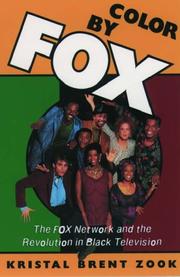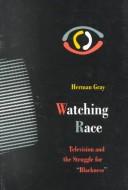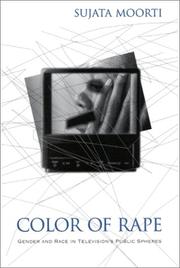| Listing 1 - 10 of 11 | << page >> |
Sort by
|

ISBN: 1280533773 0195355652 9780195355659 9780195106121 0195106121 9786610533770 6610533776 0195105486 9780195105483 0195106121 0195105486 9780195105483 0197723497 9781280533778 Year: 1999 Publisher: New York : Oxford University Press,
Abstract | Keywords | Export | Availability | Bookmark
 Loading...
Loading...Choose an application
- Reference Manager
- EndNote
- RefWorks (Direct export to RefWorks)
Locating a persistent black nationalist desire - yearning for home and community - in the shows produced in the 1980s and 1990s, Zook shows how the Fox hip-hop sitcom both reinforced and rebelled against earlier black sitcoms from the 1960s and 1970s.
Book
ISBN: 1461918030 143844480X 9781461918035 9781438444802 9781438444796 1438444796 Year: 2012 Publisher: Albany
Abstract | Keywords | Export | Availability | Bookmark
 Loading...
Loading...Choose an application
- Reference Manager
- EndNote
- RefWorks (Direct export to RefWorks)
While previous scholarship on African Americans and the media has largely focused on issues such as stereotypes and program content, Struggles for Equal Voice reveals how African Americans have utilized access to cable television production and viewership as a significant step toward achieving empowerment during the post–Civil Rights and Black Power era. In this pioneering study of two metropolitan districts—Boston and Detroit—Yuya Kiuchi paints a rich and fascinating historical account of African Americans working with municipal offices, local politicians, cable service providers, and other interested parties to realize fair African American representation and media ownership. Their success provides a useful lesson of community organizing, image production, education, and grassroots political action that remains relevant and applicable even today.
Cable television --- Television broadcasting --- African Americans on television --- African Americans in television broadcasting --- Cable TV --- CATV --- Community antenna television --- Television, Cable --- Subscription television --- Television relay systems --- Public-access television --- Afro-Americans in television --- Afro-Americans on television --- Television --- Afro-Americans in television broadcasting --- Afro-Americans in the television industry --- Social aspects --- History.
Book

ISBN: 9780813553870 9780813553863 9780813553887 0813553881 0813553873 9781461946243 1461946247 0813553865 Year: 2013 Publisher: New Brunswick, NJ
Abstract | Keywords | Export | Availability | Bookmark
 Loading...
Loading...Choose an application
- Reference Manager
- EndNote
- RefWorks (Direct export to RefWorks)
"Watching While Black exclusively considers and critically engages programs that Black audiences watch and enjoy. With fresh perspectives, contributors both expose and introduce programming targeted at very specific and under-examined Black demographics. Cutting across forty years of Black television, the book looks at behind-the-scenes practices, significant historical texts, twenty-first century shows, and programs produced for Black audiences around the world."--
African American television viewers. --- African Americans on television. --- Television broadcasting --- Social aspects --- Afro-American television viewers --- Television viewers, African American --- Television viewers --- Afro-Americans in television --- Afro-Americans on television --- Television
Book
ISBN: 0671675389 Year: 1989 Publisher: New York Simon & Schuster
Abstract | Keywords | Export | Availability | Bookmark
 Loading...
Loading...Choose an application
- Reference Manager
- EndNote
- RefWorks (Direct export to RefWorks)
Book
ISBN: 025209378X 1283992507 9780252093784 9780252093784 9780252036682 0252036689 9781283992503 0252079701 Year: 2012 Publisher: Urbana
Abstract | Keywords | Export | Availability | Bookmark
 Loading...
Loading...Choose an application
- Reference Manager
- EndNote
- RefWorks (Direct export to RefWorks)
This work explores the crucial role of network television in reconfiguring new attitudes in race relations during the civil rights movement. The book provides an analysis which makes us think about the relationship between the media and the civil rights movement.
Television broadcasting --- Civil rights movements --- African Americans in television broadcasting --- Race relations on television. --- African Americans on television. --- Television broadcasting of news --- Afro-Americans in television broadcasting --- Afro-Americans in the television industry --- Race relations in television --- Television --- Afro-Americans in television --- Afro-Americans on television --- Television coverage of news --- Television journalism --- Television news --- Broadcast journalism --- Telecasting --- Television industry --- Broadcasting --- Mass media --- United States --- History --- Political aspects --- News --- Television and politics --- Influence.

ISBN: 0816622507 Year: 1995 Publisher: Minneapolis London University of Minnesota Press
Abstract | Keywords | Export | Availability | Bookmark
 Loading...
Loading...Choose an application
- Reference Manager
- EndNote
- RefWorks (Direct export to RefWorks)
African Americans on television --- Afro-Amerikanen op televisie --- Afro-Américains à la télévision --- 654.197 --- #SBIB:309H1522 --- #SBIB:309H525 --- Afro-Americans in television --- Afro-Americans on television --- Television --- Facsimile and television broadcasting --- Radio- en/of televisieprogramma’s met een ideologische en spiegelfunctie --- Sociologie van de audiovisuele boodschap --- African Americans on television. --- 654.197 Facsimile and television broadcasting
Book
ISBN: 9780814737200 9780814737217 9780814760765 9780814759448 0814759440 0814760767 081473720X 0814737218 Year: 2013 Publisher: New York, N.Y. New York University Press
Abstract | Keywords | Export | Availability | Bookmark
 Loading...
Loading...Choose an application
- Reference Manager
- EndNote
- RefWorks (Direct export to RefWorks)
“Black Television Travels provides a detailed and insightful view of the roots and routes of the televisual representations of blackness on the transnational media landscape. By following the circulation of black cultural products and their institutionalized discourses—including industry lore, taste cultures, and the multiple stories of black experiences that have and have not made it onto the small screen—Havens complicates discussions of racial representation and exposes possibilities for more expansive representations of blackness while recognizing the limitations of the seemingly liberatory spaces created by globalization.” —Bambi Haggins, Associate Professor of Film and Media Studies at Arizona State University “A major achievement that makes important contributions to the analysis of race, identity, global media, nation, and television production cultures. Discussions of race and television are too often constricted within national boundaries, yet this fantastic book offers a strong, compelling, and utterly refreshing corrective. Read it, assign it, use it.” —Jonathan Gray, author of Television Entertainment, Television Studies, and Show Sold Separately Black Television Travels explores the globalization of African American television and the way in which foreign markets, programming strategies, and viewer preferences have influenced portrayals of African Americans on the small screen. Television executives have been notoriously slow to recognize the potential popularity of black characters and themes, both at home and abroad. As American television brokers increasingly seek revenues abroad, their assumptions about saleability and audience perceptions directly influence the global circulation of these programs, as well as their content. Black Television Travels aims to reclaim the history of African American television circulation in an effort to correct and counteract this predominant industry lore.Based on interviews with television executives and programmers from around the world, as well as producers in the United States, Havens traces the shift from an era when national television networks often blocked African American television from traveling abroad to the transnational, post-network era of today. While globalization has helped to expand diversity in African American television, particularly in regard to genre, it has also resulted in restrictions, such as in the limited portrayal of African American women in favor of attracting young male demographics across racial and national boundaries. Havens underscores the importance of examining boardroom politics as part of racial discourse in the late modern era, when transnational cultural industries like television are the primary sources for dominant representations of blackness.
Sociology of minorities --- Telecommunication services --- Sub-Saharan Africa --- United States --- Foreign television programs --- Television programs --- African Americans on television. --- Television programs, Foreign --- Programs, Television --- Shows, Television --- Television shows --- TV shows --- Television broadcasting --- Electronic program guides (Television) --- Television scripts --- Afro-Americans in television --- Afro-Americans on television --- Television --- History and criticism. --- Social aspects --- United States of America --- SOCIAL SCIENCE / Popular Culture.

ISBN: 1282357867 9786612357862 0520937872 159734561X 9780520937871 0520233743 9780520233744 0520241444 9780520241442 9781282357860 1417573732 9781417573738 661235786X 9781597345613 Year: 2005 Publisher: Berkeley : University of California Press,
Abstract | Keywords | Export | Availability | Bookmark
 Loading...
Loading...Choose an application
- Reference Manager
- EndNote
- RefWorks (Direct export to RefWorks)
Herman Gray takes a sweeping look at black popular culture over the past decade to explore culture's role in the push for black political power and social recognition. In a series of linked essays, he finds that black artists, scholars, musicians, and others have been instrumental in reconfiguring social and cultural life in the United States and he provocatively asks how black culture can now move beyond a preoccupation with inclusion and representation. Gray considers how Wynton Marsalis and his creation of a jazz canon at Lincoln Center acted to establish cultural visibility and legitimacy for jazz. Other essays address such topics as the work of the controversial artist Kara Walker; the relentless struggles for representation on network television when those networks are no longer the primary site of black or any other identity; and how black musicians such as Steve Coleman and George Lewis are using new technology to shape and extend black musical traditions and cultural identities.
African Americans --- African Americans on television. --- Afro-Americans in television --- Afro-Americans on television --- Television --- Music --- History and criticism. --- african american culture. --- african americans. --- america. --- american politics. --- black americans. --- black artists. --- black culture. --- black musical tradition. --- black musicians. --- black political power. --- black scholars. --- collection of essays. --- cultural history. --- cultural identity. --- cultural visibility. --- legitimacy. --- lincoln center. --- nonfiction essays. --- politics of representation. --- popular culture. --- social change. --- social inclusion. --- sociology. --- united states. --- wynton marsalis.

ISBN: 0791489825 0585443068 9780585443065 079145133X 9780791451335 0791451348 9780791451342 9780791489826 Year: 2002 Publisher: New York State University of New York Press
Abstract | Keywords | Export | Availability | Bookmark
 Loading...
Loading...Choose an application
- Reference Manager
- EndNote
- RefWorks (Direct export to RefWorks)
Honorable Mention, 2003 Myers Outstanding Book Award presented by The Gustavus Myers Center for the Study of Bigotry and Human Rights in North AmericaThrough an analysis of television images of rape, this book makes important contributions to theories of the public sphere as well as feminist theories of rape. It shows how issues pertaining to race and gender are integrated in television discussions of rape, and how ideas of race, stereotypes of black (male and female) sexuality, and the perceived threat of miscegenation continue to shape contemporary attitudes toward sexual violence.
Rape --- African Americans on television. --- Rape on television. --- Assault, Criminal (Rape) --- Assault, Sexual --- Criminal assault (Rape) --- Nonconsensual sexual intercourse --- Sexual assault --- Offenses against the person --- Sex crimes --- Afro-Americans in television --- Afro-Americans on television --- Television --- Press coverage --- Sociology of the family. Sociology of sexuality --- Criminology. Victimology --- Mass communications --- United States --- Forced sexual intercourse --- Forced sexual penetration --- Penetration, Forced sexual --- Sexual intercourse, Forced --- Sexual intercourse, Nonconsensual --- Sexual penetration, Forced --- United States of America --- Images of women --- Book
Book
ISBN: 9780739188378 0739188372 149854018X 0739188380 Year: 2016 Publisher: Lanham Lexington Books
Abstract | Keywords | Export | Availability | Bookmark
 Loading...
Loading...Choose an application
- Reference Manager
- EndNote
- RefWorks (Direct export to RefWorks)
African Americans in motion pictures. --- African Americans in the motion picture industry. --- Motion pictures --- African Americans on television. --- African Americans in television broadcasting. --- Television broadcasting --- #SBIB:309H525 --- #SBIB:309H1513 --- #SBIB:309H1313 --- #SBIB:309H402 --- Afro-Americans in television broadcasting --- Afro-Americans in the television industry --- Afro-Americans in television --- Afro-Americans on television --- Afro-Americans in the motion picture industry --- Negroes in the moving-picture industry --- Afro-Americans in motion pictures --- Negroes in moving-pictures --- Social aspects --- Sociologie van de audiovisuele boodschap --- Geschiedenis en/of organisatie van de radio en/of televisie: algemeen en per land (met inbegrip van de rol van de omroep in de ontwikkelingsproblematiek) --- Geschiedenis en/of organisatie van het filmwezen: algemeen en per land (met inbegrip van de rol van het filmwezen in de ontwikkelingsproblematiek) --- Media en publiekgroepen: gebruik van de boodschap, effecten van de media, ... --- Television --- Motion picture industry --- Race films --- African Americans in motion pictures --- African Americans in the motion picture industry --- African Americans on television --- African Americans in television broadcasting --- Media en publiekgroepen: gebruik van de boodschap, effecten van de media, .. --- Media en publiekgroepen: gebruik van de boodschap, effecten van de media, . --- Media en publiekgroepen: gebruik van de boodschap, effecten van de media,
| Listing 1 - 10 of 11 | << page >> |
Sort by
|

 Search
Search Feedback
Feedback About UniCat
About UniCat  Help
Help News
News